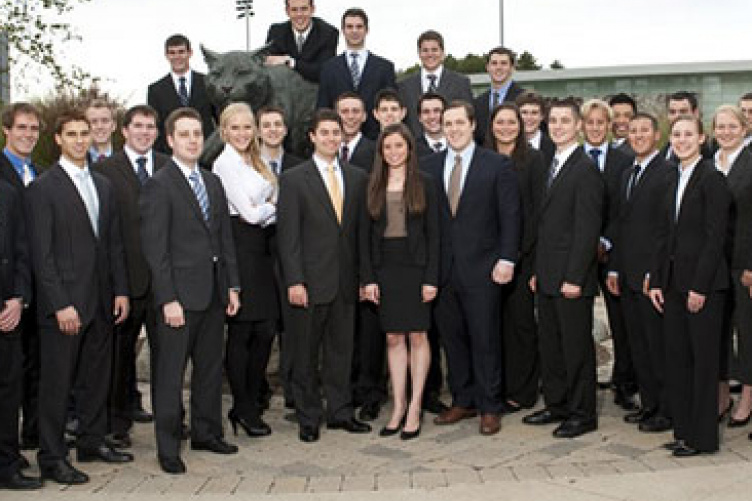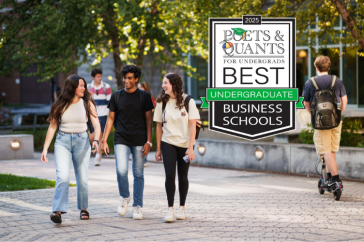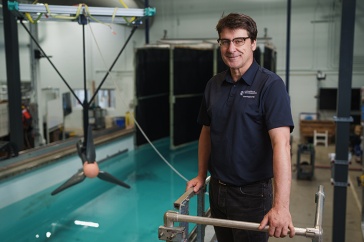
The Atkins Investment Group is a completely student-managed investment fund at the UNH Whittemore School of Business and Economics, overseeing approximately $100,000 in long-equity positions.
When it comes to sustainability, UNH is out front. It has earned top ratings from the Sierra Club and the Association for the Advancement of Sustainability in Higher Education. It offers academic programs ranging from an undergraduate dual major in EcoGastronomy to a Ph.D. in Natural Resources and Earth System Sciences. Buses powered by alternative fuels transport commuters to and from campus, and local foods are available in the dining halls.
Soon, the student-run Atkins Investment Group — a select team of undergraduates that manages a portfolio valued at more than $100,000 — may also consider sustainability when deciding which stocks to buy. Next week, two members of the group will attempt to sell the other 33 on the merits of sustainable investing. The approach would evaluate companies on their financial performance and on environmental, social and governance factors. These can range from whether a company follows clean-air standards to its worker-safety record.
“I think there are multiple ways to mitigate climate change, environmental degradation, the social ills of the world — and one of those is through sustainable investing,” says Austin Perea '13, an Atkins member who is leading the sustainability initiative with help from Brian Morin '13. “It’s accounting for impacts that are incredibly detrimental.”
Whittemore School Associate Professor of Finance Stephen Ciccone, who also serves as a faculty adviser to Atkins, is excited about the students’ efforts — but says their task won’t be easy. “Not only do they have to convince the group of the sustainability aspects, but they also have to be picking good stocks based on traditional measures. My feeling is the group is going to be a little skeptical otherwise.”
Since its inception in 2004, the Atkins Group has made investment decisions based on financial criteria such as earnings and sales growth. It has been a fruitful strategy, with the group’s Wildcat Fund frequently outperforming the S&P 500, a leading benchmark for the U.S. stock market. Perea and Morin will recommend that the Atkins Group invest in a European pharmaceutical company — they’re still deciding which one and how many shares — that does well on financial and sustainability measures. For instance, the companies they are looking at provide medications at steep discounts to people in developing countries and successfully manage water risks associated with the drug manufacturing process.
But the students’ aim is bigger than pitching a particular stock. “The more encompassing goal is to try to get the group to use this kind of analysis across the individual investment sectors,” says Perea, a political science and economics major. “We hope to implement it on more of a wide-range scale throughout the fund.”
Perea wants to persuade the group that sustainable investing makes sense from a financial standpoint because sustainable companies reduce their risk of regulatory fines, costly civil litigation, and reputational damage. (Think of the fallout for BP after the Deepwater Horizon oil spill.) In fact, corporations that followed sustainable policies over many years showed better long-term performance on the stock market than similar corporations without sustainable polices, according to a 2011 study by professors at Harvard and London business schools.
Such findings have made sustainable investing increasingly appealing to investors. A 2010 report from the nonprofit US SIF–The Forum for Sustainable and Responsible Investment, found that almost one in eight professionally managed dollars in the United States was being invested according to this strategy. Student investors are also paying greater attention to sustainability.
“It’s part of a national movement at universities and at business schools in particular toward a more socially conscious form of capitalism,” says Yusi Turell, executive director of the Carsey Institute’s Center on Social Innovation and Finance. “This kind of investing has been around for long enough that we see we can get market or above returns, and that it’s actually a good risk-management strategy. In addition to financial performance, more people are trying to be deliberate about how they spend their resources, their time, their money. So socially responsible investing is consistent with how they, and especially the next generation, want to live.”
The impetus for introducing sustainable investing to the Atkins Group came in part from Perea’s Carsey Institute Social Innovation Internship last summer at Pax World Management LLC, a leading sustainable investing advisor in Portsmouth. (It’s one of two such companies that host the interns; Gina Guadagnoli ’13 worked at Veris Wealth Partners Portsmouth.) These internships serve as training for students like Perea who are involved in Net Impact UNH, the university chapter of a national organization that aims to promote sustainability through business. “It’s a great example of individual student experiences driving broader change,” Turell says.
Originally published by:
UNH Today
Written by Sonia Scherr '13 MFA

















































